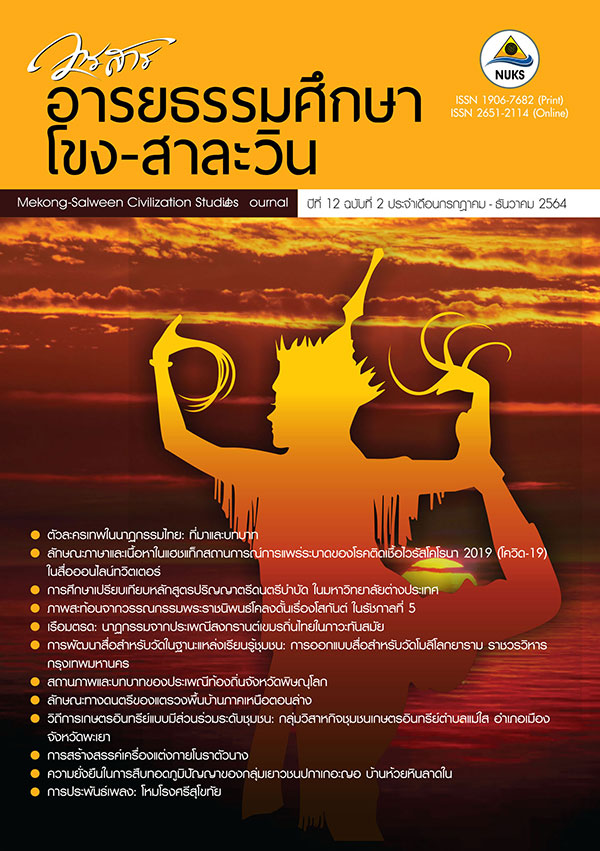Community Participatory Organic Farming Way: Organic Agriculture Community Enterprise Group in Mae Sai Subdistrict, Mueang, Phayao Province วิถีการเกษตรอินทรีย์แบบมีส่วนร่วมระดับชุมชน: กลุ่มวิสาหกิจชุมชนเกษตรอินทรีย์ตำบลแม่ใส อำเภอเมือง จังหวัดพะเยา
Main Article Content
Abstract
This research aimed at studying the socio-economic conditions, analyzing the operating conditions according to the organic farming method, and proposing guidelines for the development of organic farming methods of the Organic Farming Community Enterprise Group in Mae Sai Sub-district, Mueang district, Phayao Province. There were several methods of data collection, namely exploring related documents, non-participant observation, in-depth interviews, and small focus group discussions. The key informants were 12 people selected by the specific method: 3 chairmen of the management team and 9 representatives of members of the Organic Agriculture Community Enterprise Group. The findings showed that the community enterprise currently had 63 members. Their role was to exchange organic farming knowledge emphasizing self-sufficiency. Furthermore, the local government and other agencies in Phayao Province gave proper support to the community enterprise in terms of training program, organic product improvement, and marketing. The results of the potential analysis of the Organic Farming Community Enterprise Group in Mae Sai Sub-district with SWOT analysis techniques showed that the strengths were that there were community sages with long experience in organic farming and a strong management team, and all members were trained in organic agriculture. The weaknesses were that most of them had not drawn up production plans yet. Additionally, most members were elderly who lacked marketing management. Moreover, their products sold at community markets did not have different prices from conventional vegetables. Regarding opportunities, since it was the large enterprise group, it was mostly supported by local government agencies at both provincial and district levels, from educational institutions in the community. Also, the Sustainable Agriculture Network of Phayao provided knowledge and support on organic farming. The obstacles was the drought resulting in production that was not as needed and lacked continuity. The covid-19 pandemic had also affected consumers' purchases. In this study, there were 3 approaches offered to enhance the capacity of this community. Approach 1 (Strategy for upstream) empowered management of the community enterprise by providing a study of the competitive environment context of community enterprises with SWOT Analysis techniques, developing a business plan to achieve the goals in 1 year, and increasing the production potential of group members who were ready for organic agriculture to meet participating organic standards. Sustainable Development Goals Participatory Guarantee System (SDGsPGS) would enable more members of the Community Enterprise Group to receive the Certificate of Organic Agriculture Standards each year. Approach 2 (the midstream strategy) was to increase production management skills and organic product marketing management skills for group members. Finally, Approach 3 (downstream strategy) increased the distribution channels for organic products through the Phayao Sustainable Agriculture Network.
Downloads
Article Details
References
Agricultural Research Development Agency. (2018). What is organic farming and why is organic farming?Retrieved June 12, 2021, from https://www.arda.or.th/knowledge_detail.php?id=17
Athinuwat,D. et al. (2016). What is Participatory Guarantee System of Organic Standard? The Journal of Science and Technology, 5(2), 119-134. Retrieved June 12, 2021, from https://pgs6 organic.org/userfiles/file/V.pdf
Creswell, J. W. (2018). Research design: Qualitative, quantitative, and mixed methods approach (5th ed.). Thousand Oaks, CA: Sage.
Green Net. (2019). Organic Farming Approach. Retrieved June 12, 2021, from https://www.greennet.or.th/แนวทางเกษตรอินทรีย์/
Green Net. (2021). World Organic Farming Update: Thailand is coming fast – maybe going fast too. Retrieved June 12, 2021, from https://www.greennet.or.th/2102-world-oa/.
Hangsoongnern, T., Angkasith, P., Opatpatanakit, A., & Sirisunyluck, R. (2014). Organic farming system in the context of sufficiency economy: Case study of organic farmers in Mae Rim watershed, Chiang Mai province. Journal of Agriculture (Thailand), 30(1) ,61-69. Retrieved June 12, 2021, from https://li01.tci thaijo.org/index.php/joacmu/article/view/245867/168084
Industrial Promotion Center Region 1. (2018). Organic farming: Turn around Thai farmer's way. Retrieved June 12, 2021, from https://www.dip.go.th/files/Cluster/2.pdf
Intaprom, W. (2019, July 15). Analysis and Presentation of Qualitative Data Analysis. Academic Journal Phranakhon Rajabhat University, 10(2), 314-333. Retrieved June 12, 2021, from https://so01.tcithaijo.org/index.php/AJPU/article/view/164379
Leksuit, S. & Pituratjarurnkoon, P. (2020, April 30). Development of an Organic Marketing Model of Sustainable Agriculture Network, Lamphun. Journal of Humanities and Social Sciences Thonburi University, 14(2), 76-87. Retrieved June 12, 2021, from https://so03.tcithaijo.org/index.php/trujournal/article/view/240208/164577
Maneechoti, S. & Athinuwat, D. (2019, March 24). Participatory Guarantee Systems Application to Organic Farming Extension within Small Farmer Community. Thai Journal of Science and Technology, 8(5), 454-467. Retrieved June 12, 2021, from https://li01.tci-thaijo.org/index.php/tjst/article/view/197009/136964
Organic Food Network. (2018). Organic Farming and Organic Food Trends. Faculty of Engineering and Agro-Industry, Maejo University, Retrieved June 12, 2021, from http://www.organicfood.mju.ac.th/?p=325
Phayao Sustainable Agricultural Federation. (2021). Report of the committee for certification of organic Agriculture 1/2021. Phayao: Author.
Sansawat, B., Somyana, W., Soonthornvipat, T., & Chanrattanayothin, P. (2021, July 23). Promoting the Production of Organic Agricultural Product in the Chiang Mai Community to Upgrade the Potential of Competitive in ASEAN. Chiang Mai Rajabhat Research Journal, 22(1), 179-196. Retrieved June 12, 2021, from https://so05.tcithaijo.org/index.php/cmruresearch/article/view/241800/170139


